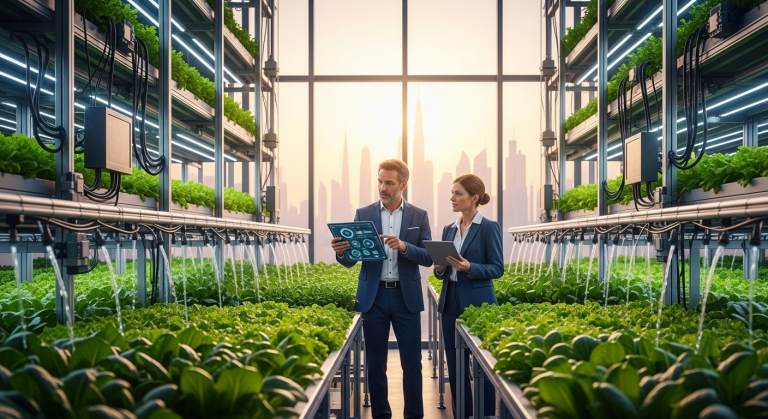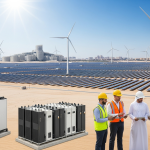Market Analysis and Opportunities
The United Arab Emirates, and Dubai in particular, represent a fertile ground for Smart agriculture technology solutions, driven by government-led initiatives, a growing agri-tech sector, and strong investor appetite for sustainable ventures. Understanding the market size, growth trends, and consumer behaviors is critical for entrepreneurs, investors, and managers looking to capitalize on this promising sector.
Target Market Size and Growth
According to the UAE Ministry of Climate Change and Environment, the national agri-tech market is projected to grow at a CAGR of 12% from 2023 to 2027, reaching AED 2.8 billion by 2027. Dubai, with its smart city ambitions and innovation-friendly Free Zones, is at the forefront, hosting a concentration of tech-driven agriculture initiatives, vertical farms, and government-backed pilot projects.
Consumer Behavior and Industry Trends
- Demand for Sustainable Produce: UAE consumers, especially in Dubai, increasingly prioritize locally grown, chemical-free produce. Premium buyers are willing to pay more for traceable, green products.
- Rapid Digital Transformation: The market shows a preference for traceability, transparency, and tech-enabled solutions (IoT, AI-driven monitoring, remote diagnostics).
- Government Support: Strategic initiatives like the UAE National Food Security Strategy 2051 foster agri-tech growth, offering incentives and regulatory support for innovative startups and solutions.
- B2B and B2C Channels: Both large commercial farms and urban consumers show rising interest in vertical farming kits, precision irrigation, smart farm management, and organic food outlets.
Marketing Needs and Strategies
To penetrate the Dubai market, comprehensive marketing strategies are essential:
- Data-Driven Market Research: Conducting in-depth market studies to identify key segments and buyer personas within the UAE agri-tech sector.
- Digital Campaigns: Leveraging SEO for high-intent keywords (“business in Dubai,” “investment in UAE agriculture”), alongside pay-per-click (PPC) ads and targeted social media campaigns on LinkedIn and Instagram.
- Brand Development: Building a distinct visual identity focused on innovation, sustainability, and efficiency.
- Thought Leadership: Sharing expertise via webinars, thought pieces, and networking events to build credibility and trust.
Expansion Potential
- Geographical Growth: Opportunities abound beyond Dubai into Abu Dhabi, Sharjah, and regional GCC markets facing similar climate and food security challenges.
- Product Diversification: Expanding into B2C (smart home farms) or export markets for technology kits, sensors, and cloud-based monitoring platforms.
- Strategic Partnerships: Forming alliances with local distributors, supermarket chains, or government projects, and leveraging networks like Persian Horizon for market entry.
Comprehensive Business Overview
Smart agriculture technology solutions represent a convergence of technology, innovation, and sustainability, designed to revolutionize food production and supply in the UAE’s challenging arid climate. This venture focuses on using advanced technologies to enhance agricultural efficiency, yield, and environmental stewardship.
Industry and Business Model
- Industry: Agri-Tech (Agricultural Technology), with applications in smart farming, IoT, AI, remote sensing, and data analytics.
- Business Model: B2B (servicing commercial farms, government projects), B2C (serving urban dwellers and home growers), and D2C (direct-to-consumer smart kits and subscriptions for farm data insights).
- Target Audience: Large-scale commercial growers, agri-businesses, urban farmers, hospitality groups (hotels, restaurants), retail partners, government food security agencies, and tech-oriented entrepreneurs.
- Operational Scope: Solutions are operational throughout the UAE, with a focus on Dubai for pilot deployments, commercial scaling, and regional expansion.
Mission, Vision, and Objectives
- Mission: To lead the sustainable transformation of UAE agriculture by deploying cutting-edge digital technologies and driving food security.
- Vision: To become the Emirates’ and GCC’s most trusted provider of smart agri-tech solutions, championing climate resilience, profitability, and greener urban communities.
- Core Objectives:
- Digitize farm management for optimal resource use.
- Increase yields while reducing environmental footprint.
- Support Dubai’s food security and innovation goals.
- Educate and empower local producers and consumers.
Business Stage and Location
Most smart agriculture ventures in the UAE, including the case analyzed, are in the startup to growth stages. The best location for such initiatives is typically a Dubai Free Zone (such as Dubai Silicon Oasis or Dubai Science Park), which offers 100% foreign ownership, tax advantages, and robust tech infrastructure.
Competitive Advantage
Smart agriculture technology solutions stand out in a rapidly evolving market due to their unique strengths and value propositions.
Unique Value Proposition (UVP)
- Proprietary Technology: Use of AI-based predictive analytics, IoT-enabled sensors, and end-to-end farm automation distinguishes the venture from traditional agriculture businesses.
- Local Customization: Solutions are uniquely tailored to UAE’s arid climate and water scarcity, featuring advanced hydroponics, smart irrigation, and soil-less farming options.
- Partnerships: Collaboration with UAE universities, research centers, and global agri-tech leaders ensures access to the latest R&D and market insights.
Key Strengths for Stakeholders
For Entrepreneurs:
- Low direct competition compared to traditional agriculture players, offering rapid market entry benefits.
- Potential for IP development (software algorithms, patented hardware), enabling long-term brand value.
- Eligibility for government grants and innovation incentives makes initial go-to-market more affordable.
For Investors:
- Rising demand for local, sustainable food production aligns with government priorities (Vision 2030, Food Security Strategy), ensuring strong policy support.
- High scalability thanks to tech-driven, modular solutions (software and hardware upgrades, cloud platforms).
- Exit opportunities via acquisition by regional agribusinesses, global food tech players, or IPO on regional exchanges.
For Managers:
- Automation minimizes operational overhead and optimizes management efficiency.
- Comprehensive dashboards and data analytics enable better decision-making and real-time performance monitoring.
- Diverse B2B, B2C, and institutional customer bases reduce reliance on any one sector.
Financial and Investment Needs
A robust understanding of the financial landscape is crucial for investors and operators considering market entry or expansion.
Financial Requirements
Initial and recurring capital needs should be carefully budgeted:
- Startup Costs:
- Company formation and licensing (AED 30,000–80,000, depending on Free Zone or Mainland)
- IoT equipment, cloud software, and automation platforms (AED 200,000–1,000,000 depending on scope)
- Office space or co-working hubs (AED 30,000–100,000 annually in Dubai)
- Operational Expenses:
- Staffing and HR (AED 500,000 annually for a team of 10–12)
- Marketing and business development (AED 150,000–400,000 annually, covering digital, events, partnerships)
- Research and development (AED 100,000–300,000 per year)
Investment Potential
The sector is highly attractive for early-stage and growth investors:
- Estimated ROI of 15–22% within the first 3–5 years, based on increased produce yields, reduced water costs, and service subscriptions.
- High scalability through SaaS-based farm management platforms and recurring revenue from support services.
- Equity and venture funding models preferred, though debt financing is accessible for asset-backed investments.
Financial Risks and Mitigation
- Risks: Cash flow volatility due to project delays, high upfront tech costs, regulatory changes, or fluctuating demand.
- Mitigation: Maintain cash reserves, diversify revenue through consulting and B2C, insure critical assets, and utilize legal frameworks for risk reduction.
Human Resources and Recruitment
A high-performing team is central to success in the fast-moving Dubai business environment.
Workforce Needs
- Headcount: 10–15 initially, including project managers, IoT developers, data scientists, agri-engineers, marketing specialists, and customer support.
- Skills: Experience in IoT systems, cloud computing, AI, agricultural science, and UAE market know-how are crucial.
- Mix: Blend of permanent (tech, management) and temporary (project, support) staff, augmented with specialist consultants.
HR Challenges and Solutions
- Attraction: The UAE’s competitive tech sector makes it challenging to recruit and retain top digital talent.
- Retention: Offer competitive salaries, stock options, professional development, and flexible work arrangements.
- Training: Invest in certification programs and on-the-job learning with leading agri-tech vendors and UAE universities.
Compliance with UAE Labor Laws
- Align HR policies with UAE labor laws: work visas, formal labor contracts, WPS-compliant payroll, end-of-service benefits.
- Use government-accredited PRO services for visa processing and regulatory updates.
- Establish clear grievance, appraisal, and compliance procedures.
Infrastructure and Operations
An efficient operational backbone is vital for seamless delivery and scaling.
Infrastructure Needs and Solutions
- Office Space: Dubai Free Zone hubs with tech clusters offer cost-effective and well-connected locations.
- Technology Stack: Cloud-based farm management software, IoT devices, data security solutions, and remote diagnostics platforms.
- Supply Chain: Local partners for sensors, hydroponics equipment, and testing labs reduce delays and costs.
Operational Optimization
- Process Weaknesses: Manual order management, fragmented data, or inefficient support response can hamper growth.
- Improvements: Adopt ERP platforms to streamline sales, inventory, and field operations. Implement lean processes and remote troubleshooting tools.
Legal Compliance
- Ensure timely company registration with the Department of Economic Development (DED) or Free Zone authorities.
- Secure proper business licenses for tech, consulting, and hardware import/export.
- Open and maintain local corporate bank accounts for smooth financial operations.
- Periodically review regulations for compliance with trade, labor, tax, and product standards.
Innovation and Technology
- Continuous investment in AI, machine learning, and remote monitoring systems keeps the business agile and competitive.
- Digitization priorities: Automate customer onboarding, introduce predictive analytics dashboards, and explore blockchain-based traceability.
Marketing and Branding Strategies
Effective marketing and branding fuel customer acquisition and credibility, especially in Dubai’s image-conscious market.
Brand Status and Perception
- Strengths: Early adopters in the UAE value brands committed to innovation and sustainability.
- Areas for Improvement: Broader public awareness and differentiation from general tech or farm supply companies is required.
Marketing Channels and Optimization
- Prioritize SEO—optimize for agri-tech and Dubai business-related keywords to capture inbound leads.
- Invest in pay-per-click campaigns targeting business owners, agribusinesses, and sustainability-conscious organizations.
- Leverage LinkedIn for B2B lead generation and Instagram for showcasing smart farming results.
- Collaborate with popular UAE events, trade shows, and sustainability expos.
- Partner with professional marketing and advertising specialists such as Sales and Advertising Services.
360-Degree Campaigns
- Integrate social media, email newsletters, website updates, and event sponsorships for omnichannel presence.
- Showcase testimonials, case studies, and live demos to drive engagement and trust.
- Cross-promote via industry blogs and news platforms, like the Persian Horizon News section.
Growth and Development Potential
Scalability and development are central to securing a lasting presence in the competitive UAE market.
Growth Strategies
- Focus on market penetration in Dubai, followed by expansion into Abu Dhabi, regional Free Zones, and the broader GCC.
- Pursue government contracts, pilot projects, and strategic partnerships with retail brands or institutional buyers.
- Consider internationalization via export-ready product lines.
Networking and Collaboration
- Leverage connections with local accelerators, incubators, and governmental bodies.
- Tap into international networks for best practices and technology exchange, utilizing networks like the 57-country footprint of Persian Horizon.
International Potential
Dubai serves as a regional business gateway. Successful scaling in Dubai/Abu Dhabi can segue into Saudi Arabia, Oman, Egypt, and beyond. Export of specialized agri-tech solutions supports wider adoption across food-insecure regions.
Sustainability and Innovation
Smart agriculture aligns with the UAE’s Vision 2030 in promoting:
- Water conservation and efficient energy use
- Urban food production and reduced footprint
- Integration of waste-to-energy or solar-powered solutions
- Tech-driven educational initiatives and upskilling for local youth
Alignment with Dubai’s Market
Local fit and strategic alignment are critical differentiators for success.
Cultural Alignment and Adaptation
- Multi-lingual service (Arabic, English, Hindi) and culturally relevant messaging support engagement with Dubai’s cosmopolitan populace.
- Community outreach and educational partnerships strengthen ties with public and private stakeholders.
Regulatory Compliance
- Smart agriculture technology businesses must comply with UAE commercial, import/export, labor, and data protection laws.
- Periodic legal reviews and reliance on expert Business Setup Services ensure ongoing compliance.
Advantages of Dubai
- Tax-free environment and streamlined foreign ownership structures enable rapid business scaling.
- World-class digital and physical infrastructure—fiber optic connectivity, logistics parks, and access to R&D funding.
- Proximity to MENA and Asian markets positions Dubai as a natural export hub.
Local Challenges and Solutions
- High Competition: Distinguish through proprietary tech and strategic partnerships with global agri-tech leaders.
- Operational Costs: Employ lean management, shared service centers, or home-grown tech solutions to manage overheads.
- Regulatory Updates: Stay agile with regulatory monitoring and expert support from local consultants.
Conclusion
Smart agriculture technology solutions present significant Dubai business opportunities through innovative, sustainable agri-tech services aligned with the UAE’s future vision. With robust market demand, supportive regulatory frameworks, and government incentives, this sector offers high returns for entrepreneurs and investors alike. Key success factors include the rapid adoption of digital tools, strategic brand positioning, compliance with local regulations, and leveraging Dubai’s world-class business infrastructure.
To accelerate your journey or expand your success, consider engaging trusted partners. Explore how Persian Horizon’s expert services can help set up, market, or scale your smart agriculture venture in Dubai and beyond.
Act Now to Unlock Smart Agri-Tech Growth
- Connect with Persian Horizon for tailored advice on Dubai business opportunities.
- Visit their blog for the latest market insights, or explore their comprehensive service portfolio.
Position your investment in Dubai for sustainable, technology-driven growth—start your smart agriculture journey today.







